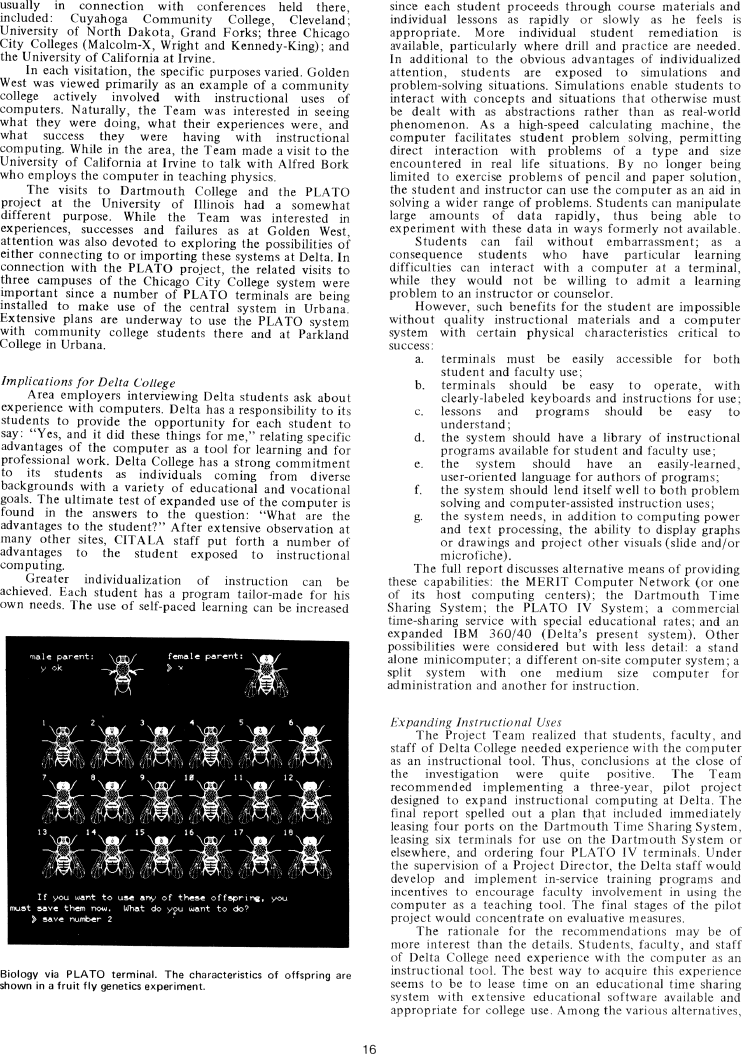The Best of Creative Computing Volume 1 (published 1976)
CITALA

usually in connection with conferences held there,
included: Cuyahoga Community College, Cleveland;
University of North Dakota, Grand Forks; three Chicago
City Colleges (Malcolm-X, Wright and Kennedy-King); and
the University of California at Irvine.
In each visitation, the specific purposes varied. Golden
West was viewed primarily as an example of a community
college actively involved with instructional uses of
computers. Naturally, the Team was interested in seeing
what they were doing, what their experiences were, and
what success they were having with instructional
computing. While in the area, the Team made a visit to the
University of California at Irvine to talk with Alfred Bork
who employs the computer in teaching physics.
The visits to Dartmouth College and the PLATO
project at the University of Illinois had a somewhat
different purpose. While the Team was interested in
experiences, successes and failures as at Golden West,
attention was also devoted to exploring the possibilities of
either connecting to or importing these systems at Delta. In
connection with the PLATO project, the related visits to
three campuses of the Chicago City College system were
important since a number of PLATO terminals are being
installed to make use of the central system in Urbana.
Extensive plans are underway to use the PLATO system
with community college students there and at Parkland
College in Urbana.
Implications for Delta College
Area employers interviewing Delta students ask about
experience with computers. Delta has a responsibility to its
students to provide the opportunity for each student to
say: "Yes, and it did these things for me," relating specific
advantages of the computer as a tool for learning and for
professional work. Delta College has a strong commitment
to its students as individuals coming from diverse
backgrounds with a variety of educational and vocational
goals. The ultimate test of expanded use of the computer is
found in the answers to the question: "What are the
advantages to the student?" After extensive observation at
many other sites, CITALA staff put forth a number of
advantages to the student exposed to instructional
computing.
Greater individualization of instruction can be
achieved. Each student has a program tailor-made for his
own needs. The use of self-paced learning can be increased
[image]Biology via PLATO terminal. The characteristics of offspring are
shown in a fruit fly genetics experiment.
since each student proceeds through course materials and
individual lessons as rapidly or slowly as he feels is
appropriate. More individual student remediation is
available, particularly where drill and practice are needed.
ln additional to the obvious advantages of individualized
attention, students are exposed to simulations and
problem-solving situations. Simulations enable students to
interact with concepts and situations that otherwise must
be dealt with as abstractions rather than as real-world
phenomenon. As a high-speed calculating machine, the
computer facilitates student problem solving, permitting
direct interaction with problems of a type and size
encountered in real life situations. By no longer being
limited to exercise problems of pencil and paper solution,
the student and instructor can use the computer as an aid in
solving a wider range of problems. Students can manipulate
large amounts of data rapidly, thus being able to
experiment with these data in ways formerly not available.
Students can fail without embarrassment; as a
consequence students who have particular learning
difficulties can interact with a computer at a terminal,
while they would not be willing to admit a learning
problem to an instructor or counselor.
However, such benefits for the student are impossible
without quality instructional materials and a computer
system with certain physical characteristics critical to
success:
a. terminals must be easily accessible for both
student and faculty use;
b. terminals should be easy to operate, with
clearly-labeled keyboards and instructions for use;
c. lessons and programs should be easy to
understand;
d. the system should have a library of instructional
programs available for student and faculty use;
e. the system should have an easily-learned,
user-oriented language for authors of programs;
f. the system should lend itself well to both problem
solving and computer-assisted instruction uses;
g. the system needs, in addition to computing power
and text processing, the ability to display graphs
or drawings and project other visuals (slide and/or
microfiche).
The full report discusses alternative means of providing
these capabilities: the MERIT Computer Network (or one
of its host computing centers); the Dartmouth Time
Sharing System; the PLATO IV System; a commercial
time-sharing service with special educational rates; and an
expanded IBM 360/40 (Delta's present system). Other
possibilities were considered but with less detail: a stand
alone minicomputer; a different on-site computer system; a
split system with one medium size computer for
administration and another for instruction.
Expanding Instructional Uses
The Project Team realized that students, faculty, and
staff of Delta College needed experience with the computer
as an instructional tool. Thus, conclusions at the close of
the investigation were quite positive. The Team
recommended implementing a three-year, pilot project
designed to expand instructional computing at Delta. The
final report spelled out a plan that included immediately
leasing four ports on the Dartmouth Time Sharing System,
leasing six terminals for use on the Dartmouth System or
elsewhere, and ordering four PLATO IV terminals. Under
the supervision of a Project Director, the Delta staff would
develop and implement in-service training programs and
incentives to encourage faculty involvement in using the
computer as a teaching tool. The final stages of the pilot
project would concentrate on evaluative measures.
The rationale for the recommendations may be of
more interest than the details. Students, faculty, and staff
of Delta College need experience with the computer as an
instructional tool. The best way to acquire this experience
seems to be to lease time on an educational time sharing
system with extensive educational software available and
appropriate for college use. Among the various alternatives,


